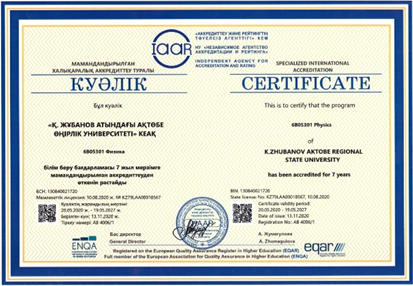
Accreditation (year of passage, period of passage):
According to the results of the audit of the non-profit external expert commission “Independent Agency for Accreditation and Rating” conducted in 2020, it successfully passed specialized accreditation for 7 years.

Training period:
Full-time: 4 years
Awarded degree:
Bachelor of science in the educational program 6B05301 – «Physics»
Field of professional activity:
- the field of experimental, theoretical and applied physics, as well as the field of related natural and technical sciences;
- The field of education, including the field of pedagogy, theory and methodology of teaching physics in secondary schools;
- Translation of scientific and technical literature from a foreign language and into a foreign language (for special units).
Objects of professional activity:
- research institutes, laboratories, design and engineering bureaus and firms;
- state educational organizations and educational enterprises, as well as non-governmental educational organizations;
- manufacturing enterprises and associations.
Subject of professional activity:
- research;
- pedagogical;
- organizational and management;
- design and technological;
- translation (for special units).
Types of professional activity:
- ensuring the effective organization and conduct of scientific research of physical phenomena and processes;
- The implementation of educational programs and curricula at a level that meets accepted educational standards.
Base practice:
Colleges of the city of Aktobe, Laboratory “Nanotechnology”, JSC “United Aktobe distance of power supply”.
Program Description –6B05301 Ba – Physics
The educational program 6B05301 Ba – Physics is aimed at training highly qualified specialists in fundamental and applied physics who are capable of solving complex scientific and engineering problems, conducting research, and applying physical principles to modern technologies.
The program includes core and advanced training in the following areas:
- Classical and modern physics
- Theoretical and mathematical physics
- Experimental research methods
- Digital and computational technologies in physics
- Applied aspects of material physics, nanotechnology, nuclear and quantum physics
Core Courses:
- Mechanics
- Electricity and Magnetism
- Thermodynamics and Molecular Physics
- Optics
- Quantum and Atomic Physics
- Nuclear and Particle Physics
- Theoretical Mechanics
- Electrodynamics
- Statistical Physics and Thermodynamics
- Basics of Numerical Modeling in Physics
- Solid-State Physics
- Experimental Methods in Physics
Graduate Competencies:
- Application of physical models to analyze and solve scientific and applied problems
- Conducting laboratory and experimental research
- Using modern digital and computational tools in physics
- Working with scientific literature, critical analysis, and hypothesis formulation
- Teaching physics at general and professional education levels
- Designing and implementing research and innovation projects
Career Opportunities:
- Research specialist in scientific and applied laboratories
- Experimental physicist
- Physics teacher in schools and colleges
- Physics engineer in industry, production, and IT sector
- Research technician in international projects
- Specialist in computational modeling of physical processes
Graduates of the program acquire the knowledge and skills necessary for successful employment at all levels of the education system, in research institutions, as well as in teaching, research, and management.
